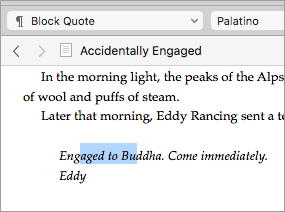

- #SCRIVENER 3 ISOLATE QUOTES FULL#
- #SCRIVENER 3 ISOLATE QUOTES WINDOWS#
#SCRIVENER 3 ISOLATE QUOTES WINDOWS#
The place, as it is depicted, can be read as a metaphor of the process of includence: “at one end they (my chambers) looked upon the white wall of the interior of a spacious skylight shaft, penetrating the building from top to bottom” (66) and further on, “the other end offered a contrast, the windows commanding an unobstructed view of a lofty wall, black by age and everlasting shade” (66). It first exists (.)ĤIn Bartleby the narrator’s world is undoubtedly governed by these two stagnating constellations which merge in the stale atmosphere of his Wall Street offices.
 1 Guillaume distinguishes two modes of existence for the significd (or significate). Close observations of his patients have led Tellenbach to posit that the specific features of the typus melancholicus result from the continuous overlapping of two more or less pathologized constellations, includence ( Includenz ) and remanence ( Remanenz): the former refers to the spatial confinement of the typus and his tendency to establish invisible barriers around himself or herself the latter signifies temporal confinement, that is the reluctance to project into a future that would not be the extension of a reified past-present and the conviction that most existential potentialities are inhibited. In his definition of the typus, he abandons the notions of subjectivity and objectivity considering with other Heideggerian phenomenologists that there are no boundaries between Dasein and its animate and inanimate environment, since all phenomena are connected. His description shows that melancholy can be a mere mood (Stimmung), that is just a mode of being “attuned” to the world however, the main interest of Tellenbach’s contribution lies in the fact that he analyzes how this mood can turn into psychosis and become a mode of being totally impervious to others and closed to the world in general. The narrator as Tellenbach’s Typus MelancholicusģHubertus Tellenbach combined the phenomenological theories of Husserl and Heidegger in a work entitled La mélancholie, published in 1979. Such an incipit opens the vertiginous abyss of the reader’s melancholia imaginationis announcing the presence of an inaccessible truth which could be the actual object of literature, but nevertheless has to do with the simple fact of being a singular man in the world.ĢIn this essay I will give a phenomenological reading of Bartleby, first as a fictitious survey of the temporality of the Typus Melancholicus defined by Hubertus Tellenbach (1914-1994), a German psychiatrist then, relying on Heidegger’s reflection in Being and Time and Gustave Guillaume’s grammatical approach to the time-picture of English in his Leçons de linguistique, I will attempt to return to the existential origins of what Enrique Vila-Matas has called “the Bartleby-syndrome”.
1 Guillaume distinguishes two modes of existence for the significd (or significate). Close observations of his patients have led Tellenbach to posit that the specific features of the typus melancholicus result from the continuous overlapping of two more or less pathologized constellations, includence ( Includenz ) and remanence ( Remanenz): the former refers to the spatial confinement of the typus and his tendency to establish invisible barriers around himself or herself the latter signifies temporal confinement, that is the reluctance to project into a future that would not be the extension of a reified past-present and the conviction that most existential potentialities are inhibited. In his definition of the typus, he abandons the notions of subjectivity and objectivity considering with other Heideggerian phenomenologists that there are no boundaries between Dasein and its animate and inanimate environment, since all phenomena are connected. His description shows that melancholy can be a mere mood (Stimmung), that is just a mode of being “attuned” to the world however, the main interest of Tellenbach’s contribution lies in the fact that he analyzes how this mood can turn into psychosis and become a mode of being totally impervious to others and closed to the world in general. The narrator as Tellenbach’s Typus MelancholicusģHubertus Tellenbach combined the phenomenological theories of Husserl and Heidegger in a work entitled La mélancholie, published in 1979. Such an incipit opens the vertiginous abyss of the reader’s melancholia imaginationis announcing the presence of an inaccessible truth which could be the actual object of literature, but nevertheless has to do with the simple fact of being a singular man in the world.ĢIn this essay I will give a phenomenological reading of Bartleby, first as a fictitious survey of the temporality of the Typus Melancholicus defined by Hubertus Tellenbach (1914-1994), a German psychiatrist then, relying on Heidegger’s reflection in Being and Time and Gustave Guillaume’s grammatical approach to the time-picture of English in his Leçons de linguistique, I will attempt to return to the existential origins of what Enrique Vila-Matas has called “the Bartleby-syndrome”. #SCRIVENER 3 ISOLATE QUOTES FULL#
Furthermore, the very first paragraph introduces the narrator as a perturbed lawyer obsessed with the imperfection of his account, the absence of materials “for a full and satisfactory biography of this man” constituting “an irreparable loss to literature” (65). 2005)ġMelancholy pervades Bartleby the Scrivener: Melville’s enigmatic short story ends with the death of the frustrating scrivener who refused to obey the narrator’s orders, systematically repeating the same answers: “I would prefer not to”, “I’d rather not to”, “I prefer not to”. Gilles Barbedette ( Magazine Littéraire, oct.-nov. C’est une conscience aiguë de ce que l’homme est fait de composantes fugitives et de composantes immuables qui est à la base du désir d’éternité.

Ce n’est pas un hasard si les œuvres mélancoliques vieillissent mieux.







 0 kommentar(er)
0 kommentar(er)
